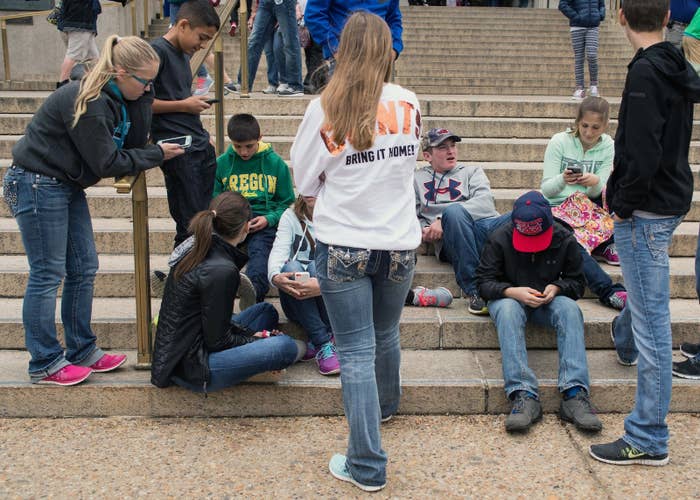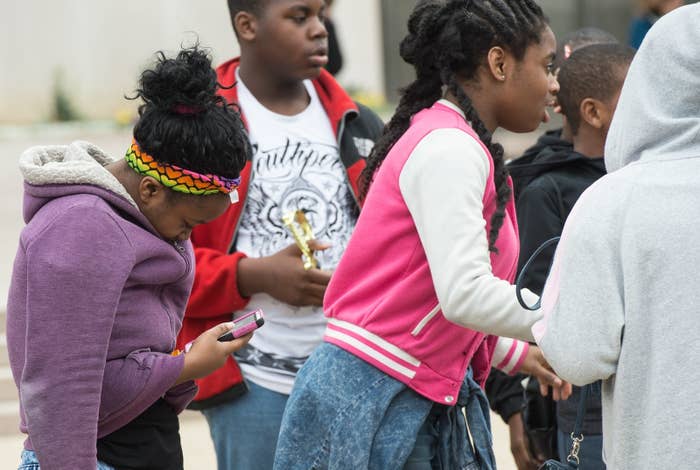
Millennials may soon yearn for the days when our breakfast habits could launch a thousand thinkpieces. The oldest of us are now exiting the coveted 18–34-year demographic, meaning our days as the darlings of marketers and chin-scratchers everywhere are numbered. The youth culture industry is already moving on, shifting its attention to the postmillennial cohort, currently nicknamed "Gen Z."
The worst example of this in recent memory was "Have Smartphones Destroyed a Generation?," a particularly panicky Atlantic cover story by psychology professor, corporate consultant, and onetime millennial-whisperer Jean M. Twenge. The Atlantic has a particular affinity for this kind of trendy worrying dressed up as somber big think — remember "Is Google Making Us Stupid?" — and Twenge delivered it in droves here, arguing that the time today's teens spend alone with smartphones is poisoning them forever.
Twenge has been on the youth-scare beat for a while, and it’s notable that she has now turned to postmillennial fearmongering. I first encountered her work back in the mid-2000s, around the time when Twitter was launching and Time magazine was declaring us all "Person of the Year."
Her first major foray into millennial thinkery was her 2006 book Generation Me: Why Today's Young Americans Are More Confident, Assertive, Entitled — And More Miserable Than Ever Before. Twenge expanded on the theme in 2009 with The Narcissism Epidemic: Living in the Age of Entitlement.
These books pandered to the same complaints old people have been making about young people since time immemorial, with just enough techno-scare to make them seem fresh and relevant. And they established Twenge as a go-to quote factory for cranky thinkpieces on millennials, ushering in a new wave of hand wringing over our supposed shortcomings.
"Why are young adults so miserable?" asked a 2006 Today Show segment on Twenge's work. "Are social norms steadily unraveling?" wondered USA Today the same year. "Too much self-esteem can be bad for your child," warned Alternet. Many teens are "overconfident" and "have wildly unrealistic expectations," said Fox News. A 2009 ABC story on Twenge's work was headlined "Today's Teens More Anxious, Depressed, and Paranoid Than Ever."
Twenge's "narcissism epidemic" narrative fit perfectly with popular confusion and fears regarding social media, technology, reality TV stars, changes in parenting styles, the disintegration of 20th-century social institutions, and the changing workforce. It also echoed popular criticism of the self-esteem movement, and the "participation trophy" fears that our cranky elders had already established about the generation then commonly called "Gen Y."
But while consumer media ate up Twenge's sky-is-falling take on millennials, her peers in academia and the scientific community began to call bullshit.
Most of Twenge's assertions about millennial narcissism come from comparing answers given by millennials, Gen X'ers, and baby boomers on an index called the Narcissistic Personality Inventory (NPI). They're also peppered with anecdotes and dubious insights drawn from everything from the antics of Britney Spears and Paris Hilton to rising rates of plastic surgery and school shootings and the popularity of subprime mortgages.
There are some generational differences in the NPI. For instance, millennials are more likely than boomers at their age to agree to statements like "I am assertive," "I like to take responsibility for making decisions," and "I can live my life any way I want to."
Yet Twenge takes these differences and teases out all sorts of unjustified conclusions.
Sure, millennials — primed our whole lives to value self-esteem and believe in the validity of individuality while our grandparents were taught to keep their heads down and follow the mainstream — may be more likely than our predecessors to identify with statements projecting confidence. We’re more inclined to say “I am going to be a great person” than “I hope I am going to be successful.” But there’s little evidence this has negative social effects in aggregate, or that it means millennials are more prone to destructive pathological narcissism.
In fact, "trends in youth behavior support the opposite conclusion," as Neil Howe and William Strauss noted in a 2007 Los Angeles Times op-ed. As evidence, they pointed to falling rates of crime, teen pregnancy, abortion, premarital sex, reckless driving, and drug use; rising rates of volunteerism; and research showing that millennials get along better with their parents than previous generations did.
According to Jeffrey Jensen Arnett, a psychology professor at Clark University, "evidence overwhelmingly shows that the self-esteem and self-belief of today’s emerging adults is not 'too high' by any reasonable reckoning."
Writing in the journal Emerging Adulthood in 2013, Arnett cautioned that Twenge's conclusions are also marred by her reliance on samples of college students. College students "are not representative of emerging adults more generally," Arnett pointed out. "They are wealthier, whiter, and (by definition) more highly educated than their noncollege peers."
It’s even more biased than it sounds. Twenge drew her conclusions from an even more rarified set within US college students: those who attend four-year residential institutions.
But even if we take Twenge's data at face value, it's not necessarily cause for alarm — and may in fact represent good news, not a generational crisis. Most of the rise in alleged narcissism comes from girls and women, and women were, until a few decades ago, often taught that that pride and confidence were unladylike. Is it really a bad thing that fewer millennial women feel the need to downplay their own strengths?
Ultimately, "the evidence just isn't there for an epidemic of narcissism or anything else" in Twenge's thesis, declared the Chronicle of Higher Education in 2010. "Social scientists would do well to exercise a degree of caution when interpreting data. Just like with the little boy who cries wolf, people are bound to notice too many phantom epidemics."
If only. Memories are short, and technology changes fast. If anything, today's accelerated news cycles and well-oiled outrage machine only increases the public appetite for phantom epidemics, which brings us back to this month’s smartphone freakout in The Atlantic.

Almost all of the problems with Twenge's millennial bullshit are on display in her somber analysis of Gen Z, which she defines to include those born from 1995 through 2012.
Perhaps aware that she needed a new shtick to stay at the top of the generational-guru game, Twenge is now claiming that, around 2012, data started showing that "many of the distinctive characteristics of the Millennial generation began to disappear" (she does not say what data shows this). And Gen Z isn't just psychologically far-removed from millennials, she says — they spend their time in far different ways, too.
All of this she blames on smartphones — and it's a superficially appealing idea. Elementary school kids now have their own iPhones. My best friend's 3-year-old can take a selfie. It's quite possible that growing up with smartphones and social media may produce distinct psychological and social effects.
But it's way too early to call them yet. And Twenge's data doesn't back up her attempt to do so.
Instead, she makes grave proclamations based purely on anecdotes, correlations — such as smartphone ownership rising alongside higher rates of teen depression — and selectively wielded data. For instance, she brings up a study suggesting more unhappiness among eighth graders who are heavy social media users, but doesn't mention that the same study found no effect for 12th graders.
Twenge "reviews only those studies that support her idea and ignores studies that suggest that screen use is NOT associated with outcomes like depression and loneliness," objected psychologist Sarah Rose Cavanagh in Psychology Today. And "nowhere is Twenge's bias more obvious ... than in some research that she actually does review but then casts aside as seemingly irrelevant to her thesis—namely, the vast counter-evidence to the 'destroyed generation' thesis contained in her headline."
This counterevidence includes ample data showing that Gen Z, like millennials before them, have far lower rates of smoking, unprotected sex, car accidents, alcohol use, and teen pregnancies. ("This is what a destroyed generation looks like?" asks Cavanagh.)
Today's teens also have a lower suicide rate than teens in the 1990s, and self-reported happiness levels among teens have held relatively steady since 1997. Neither fact fits the narrative of a generation more miserable than ever before. Instead, Twenge ignores all of this and starts throwing in buzzwords like "cyberbullying" and "Snapchat" to explain the nonexistent spike in Gen Z suicides.
Consider one of those examples: Teens today are going out unsupervised less. There are explanations for this other than teens being ruined shells of human beings — such as increased participation in extracurriculars and organized activities — that could account for this.
But more importantly, previous generations didn't have much choice but to go out if they wanted to do things like socialize with multiple friends or watch movies. Now that teens can communicate digitally or hang out together at home watching Netflix, does it really suggest a destroyed generation if they choose to do that instead of hanging out at the local movie theater?
Twenge even sees doom in teens today holding fewer part-time jobs during the school year. But at the same time, volunteering is up, as are educational demands. The minimum wage is higher, and there are tighter regulations on teen working hours. Why should we lament, as Twenge does, a 50% drop since the 1970s in eighth graders working for pay?
Twenge tells parents the best thing they can do for their kids' health and happiness is to make them put down the smartphones. I suggest it’s the parents who should close their browsers for a minute — at least long enough to stop reading panic pieces by snake oil generational theorists. The kids, by almost all measures, are more than alright.
Outside Your Bubble is a BuzzFeed News effort to bring you a diversity of thought and opinion from around the internet. If you don't see your viewpoint represented, contact the curator at bubble@buzzfeed.com. Click here for more on Outside Your Bubble.
